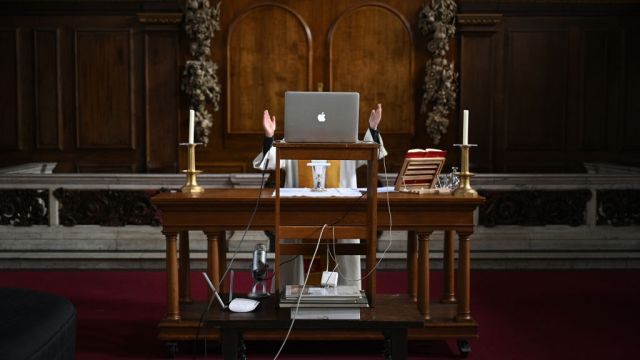Simpler, humbler, bolder. Credit: Leon Neal/Getty

“It is only through enforced standardization of methods, enforced adoption of the best implements and working conditions, and enforced cooperation that this faster work can be assured. And the duty of enforcing the adoption of standards and enforcing this cooperation rests with the management alone.”
With these words from Frederick Winslow Taylor, the so-called science of management consultancy came into being. And an era of misery began for those on the receiving end. In time, the language softened, the management gurus discovered technology and a smarter bedside manner, but the principles remained roughly the same.
Perhaps it is my inner Marxist struggling to get out – Gramsci said Taylorism inevitably gave rise to thoughts of revolution – but I was reminded of Taylor’s guiding principles as I looked through the recent directive from head office, outlining the new thinking on the organisational structures of the Church of England. The report is a series of impenetrable soul-sapping flow charts and space-ship style infographics that make those graphic medieval explanations of the trinity look like child’s play. It’s a powerpoint friendly “Vision of the Church of England in the 2020’s”. It seems the bishops have had the management consultants in. And the result is thoroughly depressing.

Taylor was born in 1856, outside Philadelphia, in a strict Quaker family his mother an ardent abolitionist. His great work ‘The Principles of Scientific Management’ was published in 1911, and it became the founding text of what became a burgeoning industry in the twentieth century. The big idea was that, armed with a more systematic approach to labour — basically a stop-watch and a clip board — the management class was able to extract greater productivity from those actually doing the job, towards whom he felt nothing but scorn.
“One of the very first requirements for a man who is fit to handle pig iron as a regular occupation is that he shall be so stupid and so phlegmatic that he more nearly resembles in his mental make-up the ox than any other type. The man who is mentally alert and intelligent is for this very reason entirely unsuited to what would, for him, be the grinding monotony of work of this character.”
Given that it was founded on such ideas, it is unsurprising that workers learned to rue the day when the slick and smiley management consultants turned up at the factory door, promising greater efficiency through organisational restructuring. Much of it, of course, was an elaborate con. As one former management consultant confessed in The Atlantic some years ago: “We kind of liked failing businesses: there was usually plenty of money to be made in propping them up before they finally went under…”
The church’s new thinking is summed up as “Simpler, Humbler, Bolder”. That sounds fine — but look a little deeper and you begin to understand that it is a euphemism for a programme of cost-cutting, parish shrinking and the invention of new (cheaper) forms of church — “a mixed economy” — outside the parish structure.
“The Church of England has written its own Treaty of Versailles, and it now going to spend a decade looking for someone to surrender to,” as Fr Marcus Walker has pointedly described it. Or as another wrote: “Come Holy Spirit, synergise those key deliverables.”
Now, I am not saying someone is making money from all of this. But I am saying that planning for failure is encouraging it. The re-engineering plan is the administration of decline dressed up as humility: run by managers, fed by slogans, designed for consumers. The language they — I suppose I should say we — increasingly now use is a curious merger of the scriptural with a kind of technocratic systems think.
Relationships with head office are increasingly mediated through electronic forms not conversations. The church says it wants to resist centralisation, and yet the centre keeps on growing, constantly bloated by the felt need to write new reports that nobody reads, develop high sounding initiatives parishes don’t want and are written in an uninspiring insider language that lacks any sort of gospel poetry.
But the people in the pews simply do not understand it. Words that one still remembers as having an inspirational purpose have been requisitioned for leaden management-ese. Under this new semantic inflection, the gospel no longer sounds like the source of life and hope. It has become a core competence.
Why not join us for “digital lab webinars”? the new churchofengland.org asks. All of this is distracting chaff, for the heart and soul of the Church of England is in its parishes. “This is why the asset stripping of our parishes over the last 30 years is so serious and concerning,” as the Archdeacon of London, Fr Luke Millar, wrote in response to this new plan yesterday. He continued: “the sense that we have at the moment that the ‘parish is bad’ and anything else is good, that inherited church is inherently un-missional, that the parochial patrimony should be swiftly swept away, is a generational mistake which we must avoid.”
In 2005, the high priests of management consultancy, McKinsey and Co admitted that “Change management as it is traditionally applied is outdated. We know, for example, that 70 percent of change programs fail to achieve their goals, largely due to employee resistance and lack of management support.” I do not mind that the church is behind the times. But I wish it was behind the times by centuries not by 30 years. And employee (clergy) resistance to this new look Church of England feels, to me at least, utterly overwhelming.
I firmly believe that the parish church has a lot more yet to give. It remains the jewel in the crown of the Church of England. But it must be properly resourced – and that means the centre has to give up much more of its wealth and power and return it to the local church. Abolish General Synod maybe. Cut the number of Diocesan posts, yes even the number of bishops.
But if the Church of England is indeed going to die, I wish it would prepare to do so with a bit more Christian dignity. We are a death and resurrection body of people, and we must trust more in that inspiring pattern of life than the cheap consolation of those who pretend we can be great again — if only we radically re-organised around the idea that we are some sort of pop-up business with God as our product.
When challenged about organised religion, I often quip that we in the Church of England generally go in for disorganised religion. And I kind of like it that way. The charismatic power of the divine cannot be neatly corralled into the channels of any one institution. But that doesn’t stop some from trying.
Of course, it may be that, like watching sausages being made, the formulation of policy is always more off-putting than what ends up on the plate. But out in the parishes, many of us are longing for inspiration, for a renewal of the energy and enthusiasm that first inspired us to work here. Instead, we are being drip fed indirect messages that the work we are doing is the ailing arm of mother church, a draining cost centre that has lost its way.
It is our vocation as a church to keep the flame of faith alive in these most secular of times. But we do not sustain God, God sustains us. He doesn’t need our help to survive, He simply asks for our faithfulness. And there can be a kind of martyrdom in that, as zoomed-out exhausted clergy remain committed to their place and their calling, and as the lonely prayer “thy kingdom come” rises from now Covid-emptied churches.
It’s more and better priests that we need, saying their prayers, serving their people. More clean-cut spreadsheet-savvy vicars who can parrot this new gospel of secular management speak? Not so much.










Join the discussion
Join like minded readers that support our journalism by becoming a paid subscriber
To join the discussion in the comments, become a paid subscriber.
Join like minded readers that support our journalism, read unlimited articles and enjoy other subscriber-only benefits.
Subscribe